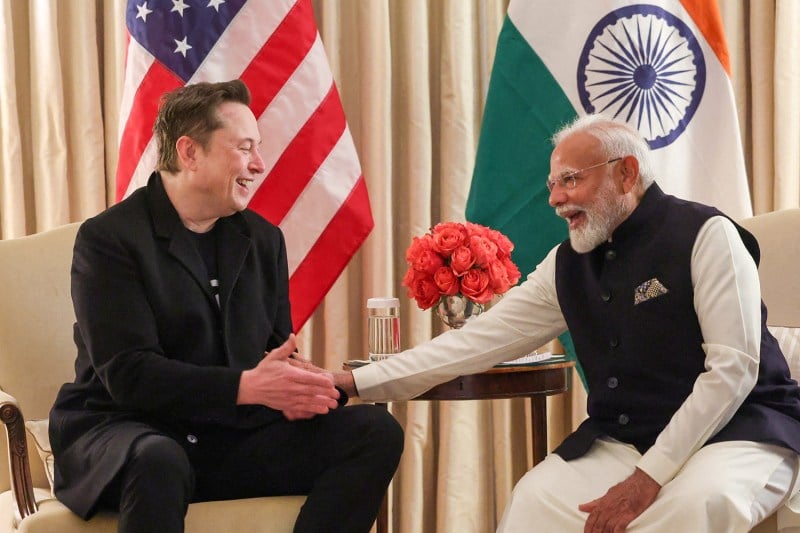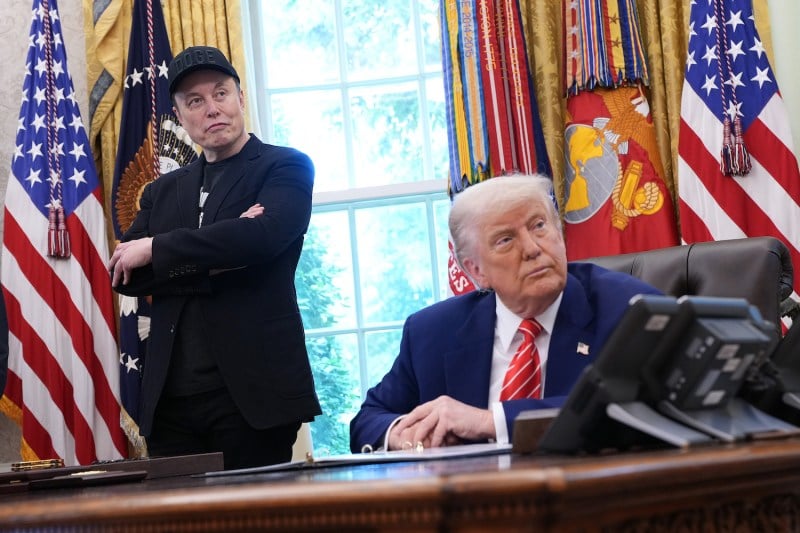India Opens Up for Trump’s Tech Backers

India Opens Up for Trump’s Tech Backers
Starlink and Coinbase just gained a foothold into the world’s second-largest internet user base.
Elon Musk and Indian Prime Minister Narendra Modi meet in Washington, D.C., on Feb. 13. Photo from X/via Reuters
Even as Starlink faces canceled contracts in Canada amid a will-they-won’t-they trade war with the United States and potentially escalating competition with rivals in Europe over the war in Ukraine, the U.S. satellite internet provider was handed a big boost on the other side of the world.
India’s two biggest telecommunications providers—Bharti Airtel and Reliance Jio—announced partnerships to bring Starlink’s services to the country on Tuesday and Wednesday, respectively, with both companies agreeing to give their hundreds of millions of customers access to Starlink’s high-speed internet services. It’s a breakthrough for Starlink and its parent company SpaceX, which have spent years trying to start operations in India but have been stymied by resistance from those same telecom players and regulatory scrutiny from the Indian government.
Even as Starlink faces canceled contracts in Canada amid a will-they-won’t-they trade war with the United States and potentially escalating competition with rivals in Europe over the war in Ukraine, the U.S. satellite internet provider was handed a big boost on the other side of the world.
India’s two biggest telecommunications providers—Bharti Airtel and Reliance Jio—announced partnerships to bring Starlink’s services to the country on Tuesday and Wednesday, respectively, with both companies agreeing to give their hundreds of millions of customers access to Starlink’s high-speed internet services. It’s a breakthrough for Starlink and its parent company SpaceX, which have spent years trying to start operations in India but have been stymied by resistance from those same telecom players and regulatory scrutiny from the Indian government.
While the first of those hurdles has been cleared with the Airtel and Jio partnership announcements, both Indian companies made it clear that the deals remain “subject to SpaceX receiving its own authorizations to sell Starlink in India.” A spokesperson for the Indian embassy in Washington, D.C., declined to comment on the status of that authorization, saying the deliberations were confidential.
It’s not difficult to see why Starlink is keen to enter the Indian market—India has more than 971 million internet users, according to the latest government data, representing nearly three quarters of the world’s largest population and second only to China’s online user base that is largely closed off to Western companies.
For India, the willingness to open its virtual doors to Starlink is more recent and possibly political.
“I suspect Starlink will get the approvals required,” said Aditya Ramanathan, a research fellow at the Bangalore-based think tank Takshashila Institution who heads its work on outer space affairs. There are several practical reasons for the Indian government to co-opt a service like Starlink, he said, including a desire to counter China’s satellite internet program and a potentially more malleable partner in its proclivity for internet shutdowns. “The Indian government would definitely prefer that Indians use a satellite internet that is operated either by Indian companies or by companies in friendly foreign countries,” he added.
But there’s another potential reason for India’s change of heart: SpaceX is owned by the world’s wealthiest man, Elon Musk, who donated hundreds of millions of dollars to U.S. President Donald Trump’s election campaign and has now become arguably the most important figure in Trump’s administration. Musk’s close alliance with Trump—who has repeatedly slammed India’s high import tariffs and threatened reciprocal tariffs of his own—is very likely to be an important consideration.
Indian Prime Minister Narendra Modi, one of the first world leaders to visit Trump in Washington after he took office for the second time, also sat down with Musk during that White House visit and said in a subsequent post on X (which Musk also owns) that the two men discussed “space, mobility, technology, and innovation.” (The Indian embassy spokesperson did not specify whether Starlink was discussed.)
India’s commerce minister, Piyush Goyal, is reportedly set to make his second trip to Washington in less than two weeks to negotiate a trade deal with the Trump administration.
“India does see very little meaningful separation today between SpaceX and the U.S. government because of Elon Musk’s role in the current administration,” Ramanathan said. “Any decision involving SpaceX and Tesla today is inherently a political decision, so it is not unreasonable to see this as part of a larger deal,” he added, referring to the Musk-owned electric carmaker that has also been negotiating with New Delhi.
Musk isn’t the only Trump backer to get a big win in India this week. On the same day that Airtel and Starlink announced their partnership, Coinbase, one of the United States’ largest cryptocurrency exchanges, announced that it had obtained approval from India’s Financial Intelligence Unit to begin operations in the country. “It enables us to offer crypto trading services in India,” the company said in a statement.
The crypto industry has faced several hurdles in India in recent years. The country’s central bank banned all cryptocurrency trading in 2018, a ban that was ultimately reversed by the India’s Supreme Court two years later. Trading of cryptocurrencies on Indian exchanges has boomed since then, despite a 30 percent tax on crypto profits, an uncertain regulatory environment, and continued warnings from the central bank about the risks of trading cryptocurrencies. In 2024, India banned several overseas cryptocurrency exchanges, including Binance and Kucoin, for allegedly running afoul of laws against money laundering.
Coinbase had initially launched in India in 2022, but the company ceased operations there less than a week later because of what CEO Brian Armstrong described as “informal pressure” from the central bank and uncertainty from India’s main digital payments regulator.
Now, the cryptocurrency firm may be benefitting from Trump’s own attitude adjustment on crypto. The U.S. president has embraced the crypto industry after years of opposing it, hosting a crypto summit at the White House last week after announcing a new strategic bitcoin reserve. That’s in large part due to the immense backing from the industry for his presidential campaign and administration—Coinbase was one of several crypto firms that donated at least $1 million to Trump’s presidential inauguration fund, with Armstrong meeting Trump on multiple occasions since he took office and attending last week’s crypto summit.
“President Trump has breathed life back into the crypto industry,” Armstrong said in a video posted from the White House. “I think the rest of the G-20 [a group of 20 governments that includes India] are looking at America now on offense in this industry and will be likely to follow suit.”
As governments around the world try to navigate the mercurial nature of Trump’s trade whims, India may set a blueprint for how concessions to his industry allies could get them a reprieve on other fronts. “It’s quite obvious that these moves are influenced by political considerations, by attempts to manage the India-U.S. relationship and make sure we don’t have major trade disputes,” Ramanathan said.
This post is part of FP’s ongoing coverage of the Trump administration. Follow along here.
Rishi Iyengar is a reporter at Foreign Policy. X: @Iyengarish
More from Foreign Policy
-

A Ukrainian machine-gunner holds an American FIM-92 Stinger portable air defense missile system for the reconnaissance and destruction of Russian drones in Zaporizhzhia, Ukraine, on Dec. 2, 2024. How Trump Is Killing the U.S. Defense Industry
It turns out that abandoning allies and tossing out security guarantees is bad for business.
-

Ukrainian President Volodymyr Zelensky talks to a group of European leaders on the sidelines of a summit in Kyiv on Feb. 24, the third anniversary of Russia’s full-scale invasion of Ukraine. Europe Is Now Led by Its North
The Nordics and Baltics are together inspiring visions of a stronger continent.
-

Trump stands at a podium with both arms outstretched and his hands open as he speaks. He wears a dark suit and a bright red tie. Trump Is Trying to Remake the United Nations
Washington has signaled that it wants the international body to focus on preserving peace, but it could be looking to rubber-stamp its bilateral priorities.
-

Donald Trump speaks during a campaign rally at Van Andel Arena on November 5, 2024 in Grand Rapids, Michigan. Trump’s Concert of Kingpins Won’t Work
A globe carved up by strongmen isn’t any world order at all.










Join the Conversation
Commenting on this and other recent articles is just one benefit of a Foreign Policy subscription.
Already a subscriber?
.
Subscribe
Subscribe
View Comments
Join the Conversation
Join the conversation on this and other recent Foreign Policy articles when you subscribe now.
Subscribe
Subscribe
Not your account?
View Comments
Join the Conversation
Please follow our comment guidelines, stay on topic, and be civil, courteous, and respectful of others’ beliefs.
Change your username |
Log out
Change your username:
CANCEL
Confirm your username to get started.
The default username below has been generated using the first name and last initial on your FP subscriber account. Usernames may be updated at any time and must not contain inappropriate or offensive language.